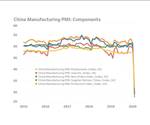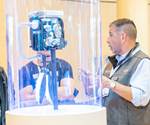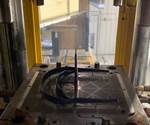3D Printing Crowdsourcing to Help Hospitals Experiencing Supply Shortages Linked to COVID-19
As the virus continues to spread worldwide and breaks supply chains, 3D printers and expertise in additive manufacturing can lend a helping hand. Potential sources identify themselves using an online directory.
When a Northern Italian hospital needed a replacement valve for a reanimation device and the supplier had run out with no way to get more in a short time, a company in the area, Isinnova, had an immediate solution. After a phone call from Massimo Temporelli, founder of the FabLab in Milan, CEO Cristian Fracassie brought a 3D printer directly to the hospital, as the 3D Printing Media Network reports, and redesigned and then produced the missing piece.
After the first valves were 3D printed using a filament extrusion system, on location at the hospital, more valves were later 3D printed by another local firm, Lonati SpA, using a polymer laser powder bed fusion process (photo below) and a custom polyamide-based material.
Many people from around the globe have meanwhile reached out to offer help in producing these parts and others, donating their AM skills. In a public document hundreds of 3D printing professionals and hobbyists, companies, design engineers and doctors have signed up willing to share their printers or design expertise to help fill the gap in supply shortages linked to COVID-19.
Related Content
-
Ice 3D Printing of Sacrificial Structures as Small as Blood Vessels
Using water for sacrificial tooling, Carnegie Mellon researchers have created a microscale method for 3D printing intricate structures small enough to create vasculature in artificial tissue. The biomedical research potentially has implications for other microscale and microfluidics applications.
-
Q&A With Align EVP: Why the Invisalign Manufacturer Acquired Cubicure, and the Future of Personalized Orthodontics
Align Technology produces nearly 1 million unique aligner parts per day. Its acquisition of technology supplier Cubicure in January supports demand for 3D printed tooling and direct printed orthodontic devices at mass scale.
-
8 Cool Parts From Formnext 2023: The Cool Parts Show #65
New additive manufacturing technologies on display at Formnext were in many cases producing notable end-use components. Here are some of the coolest parts we found at this year’s show.











